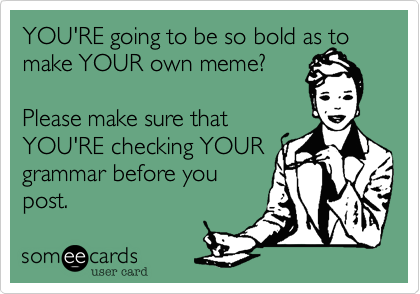First off, I’d like to say that I think you do a fantastic job of keeping the
number of, quite frankly, stupid grammar mistakes at bay and are making the
world a more coherent place one person at a time. Seriously, because of you
guys I think no one is ever going to make the mistake of using “your” instead
of “you’re” ever again, for fear of being reprimanded and publicly shamed.
Kudos on that!
 However, of late, I've been noticing a new trend in your corrections, grammar
police – the use of the word literally. Now, I fully understand that people who
post statuses about how they’re “literally dying” or how they “literally can’t
even” are annoying – I think so too. But I must wonder if this use is less of a
grammar mistake and more the eventual manifestation of literary hyperbole
finally entering mainstream cyber-language. Now before you roll your eyes just
hear me out.
However, of late, I've been noticing a new trend in your corrections, grammar
police – the use of the word literally. Now, I fully understand that people who
post statuses about how they’re “literally dying” or how they “literally can’t
even” are annoying – I think so too. But I must wonder if this use is less of a
grammar mistake and more the eventual manifestation of literary hyperbole
finally entering mainstream cyber-language. Now before you roll your eyes just
hear me out.
You see, I think that when someone says they’re “literally dying”, they
obviously don’t mean they’re actually dying – just that their emotions are so
strong that they feel as if they might keel over and die. If I’m right then
what we’re dealing with here is not a grammar issue at all. What we’re dealing
with, dear grammar police, is the use of a hyperbole.
 In case you were wondering, a literary hyperbole is a device used by writers
and poets to express strong emotions with the help of vast exaggeration. For
example if someone were to say “Oh god! This bag weighs a ton!”, we know that
the bag obviously doesn't weigh a ton but we understand the underlying meaning
- the bag is heavy and you should probably give that person a hand. The person
was fully aware that the bag didn't weigh a ton but said it anyway, in order to
efficiently convey his emotions in the most articulate way possible. Similarly,
that person you think is annoying for overusing the word “literally” is just
trying to properly express their emotions. And if they feel like “they can’t
even” --- who are we to judge?
In case you were wondering, a literary hyperbole is a device used by writers
and poets to express strong emotions with the help of vast exaggeration. For
example if someone were to say “Oh god! This bag weighs a ton!”, we know that
the bag obviously doesn't weigh a ton but we understand the underlying meaning
- the bag is heavy and you should probably give that person a hand. The person
was fully aware that the bag didn't weigh a ton but said it anyway, in order to
efficiently convey his emotions in the most articulate way possible. Similarly,
that person you think is annoying for overusing the word “literally” is just
trying to properly express their emotions. And if they feel like “they can’t
even” --- who are we to judge? Literary devices like the hyperbole and symbolism have been used by authors
probably since the very first book was written. Shakespeare was a huge fan of hyperboles.
He once wrote “This tyrant, whose sole name blisters our tongue…” I don’t think anyone called
Shakespeare out because the actor’s tongue didn't blister then and
there. It’s almost comforting to see devices once used only by the likes
of Shakespeare and Byron in everyday conversations – however annoying it may be. In fact, I’d go as far as to say that
the appearance of the subconscious use of literary devices such as this is in
fact a sign of progress (yes really) – both of the English language as well as
of the human mind.
Literary devices like the hyperbole and symbolism have been used by authors
probably since the very first book was written. Shakespeare was a huge fan of hyperboles.
He once wrote “This tyrant, whose sole name blisters our tongue…” I don’t think anyone called
Shakespeare out because the actor’s tongue didn't blister then and
there. It’s almost comforting to see devices once used only by the likes
of Shakespeare and Byron in everyday conversations – however annoying it may be. In fact, I’d go as far as to say that
the appearance of the subconscious use of literary devices such as this is in
fact a sign of progress (yes really) – both of the English language as well as
of the human mind.
Until next time,
Bianka


I absolutely love this article :) Kudos to you. Thank you for this clarification. Good luck on your blog!
ReplyDelete